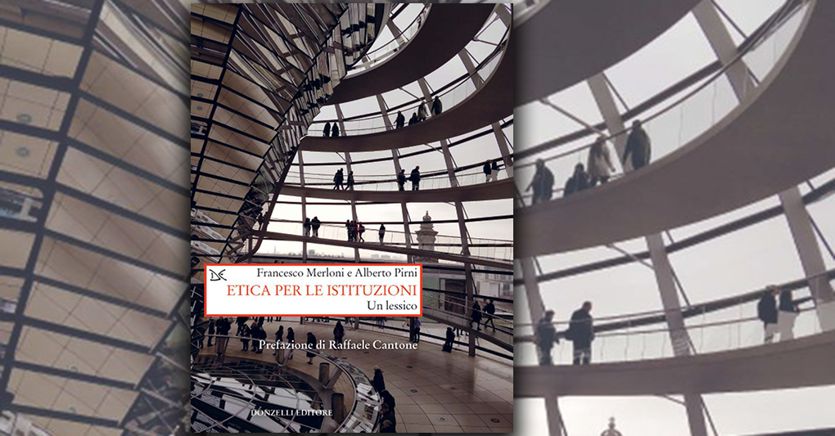We often tend to take the meaning of “ethics” for granted, when it should belong to us in the true sense of the word, so much so that it is written on everyone’s identity card. And today more than ever, in a historical moment in which States are facing an administrative effort as unexpected as it is boundless, an effort that tests the very foundations of democracy and their daily application. With the essay Ethics for institutions. A lexicon (Donzelli 2021, pp. 288, euro 28) the semantic work that engaged Francesco Merloni and Alberto Pirni, professors of Administrative Law and Moral Philosophy respectively, was to redeem some terms that we all use from the obvious and the known the days. Hegel argued: «What is known is not known. In the process of knowledge, the most common way of deceiving oneself and others is to presuppose something as known and to accept it as such ». On the other hand, in any pedagogical process, knowledge is the result of a set of notions and pragmatic experience.
Useless morals
“The moral question has existed for some time, but by now it has become the first and essential political question – Enrico Berlinguer argued to Eugenio Scalfari in 1981 – because its solution depends on the recovery of trust in the institutions, the effective governability of the country and the stability of the democratic regime “. The theme of public ethics, the title of the first chapter, is the pivot around which every action to combat corruption develops. In times of pandemic, the cultural infrastructures that form the best environment in which the official, the politician and the administrator tout court can move should be secured. Not surprisingly, the corruption that afflicts the nerve centers of the West enjoys both the popular distrust fomented by the lack of understanding between legal experts and the mass media, and a spectacularized and sensational politics that is limited to a demagogy full of moralisms.
Loading…
“Moralism” expires in the negative meaning when it brings with it hypocritical behaviors as lacking in concreteness, empty and vain media dramas, as the exasperated Guy Fawkes of Alan Moore would point out. Instead, the approach of this volume turns out to be scientific, motivated by a civil passion and resulting from a dialogue created around the various study and in-depth activities promoted by the Anac – National Anti-Corruption Authority, of which Pirni was first a member and then president since 2014. to 2020. A dialogue that represents the upward confrontation between the individual and the collective dimension, between the individual who embodies the present and his ability to overcome his own limits, reverberating the “social spirit” of Rousso’s memory. And without neglecting the ethics of the exercise of authority, which requires authority and the ability to decide effectively, so that the institution is effectively perceived in its reality and function.
Preventing corruption
In its original meaning, ethics is a habit, it is the possibility of reasoning and above all of acting consciously, answering new social questions or the same ones that others had previously raised in the same space and at the same time. Basically, every time an individual acts he performs an ethical act, a habitual but innovative act, offers a new answer to an old question of democratic coexistence, based on the logic of integrity, transparency and correctness enshrined in the Republican Constitution. There is an indissoluble and indispensable link between the fundamental rights of citizens and democratic institutions. Merloni and Pirni address the deep roots of fundamental terms such as “corruption”, “integrity”, “transparency”, “conflict of interest”, “official public “,” impartiality “,” good administration “,” bureaucracy “and” responsibility “, which deserve to be updated, freeing them from the superficial use of rhetoric. Lemmas that have been enriched with content converging with the implementation by the administrations of the anti-corruption legislation (law no. 190 and its delegated decrees).
The prospect of getting out of a crisis of global proportions painlessly is necessarily based on ethos and on upright habits that convey citizens not only in passively following the existing, but in actively implementing it. In a situation of reconstruction that inherits the reckless slogans of an era fleeing complexity, the impulse to further simplify and eliminate any bureaucratic procedure poses the risk of tomorrow being faced with the rubble of legality. Too often this country has postponed structural measures floating on states of exception, on urgent and contingent measures, on emergency situations transformed into opportunities for rebirth, but at the same time problematic for the maintenance of legality. It is not negligible that especially local administrations, although they are always in the spotlight to ensure impartiality and functionality – as well as in the management of tenders or job vacancies – have suffered cuts at every level in the last twenty years, penalizing the skills of their own officials and impoverishing themselves both quantitatively and qualitatively. “It is, once again, the banality of evil, Hannah Arendt would say – the authors specify – or its normalization, the systemic, pervasive, corruptive micro-practice, in this case, that makes the word” corruption “and the phenomenon a to which it refers less evident, less scandalous and, correspondingly, to lower the expectation of moral adequacy, to make amazement and social reaction more difficult, to defuse public shame ”.
